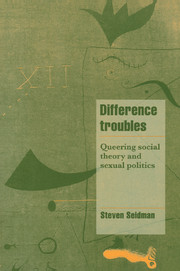Book contents
- Frontmatter
- Contents
- Preface
- Acknowledgements
- Introduction: the contemporary reconfiguring of social theory
- Part I Resisting difference: the malaise of the human sciences
- Part II Engaging difference: from lesbian and gay studies to queer theory
- Part III Democratic prospects: the politics of knowledge and identity
- Epilogue: pragmatism, difference and a culture of strong democracy
- Notes
- References
- Index
Preface
Published online by Cambridge University Press: 05 October 2010
- Frontmatter
- Contents
- Preface
- Acknowledgements
- Introduction: the contemporary reconfiguring of social theory
- Part I Resisting difference: the malaise of the human sciences
- Part II Engaging difference: from lesbian and gay studies to queer theory
- Part III Democratic prospects: the politics of knowledge and identity
- Epilogue: pragmatism, difference and a culture of strong democracy
- Notes
- References
- Index
Summary
In a sense, it is coincidental that the title of this volume evokes Judith Butler's Gender Trouble. Coincidental in that the essays are not intended as a response to or elaboration of Butler's seminal text. Coincidental too in that the essays in this volume do in fact explore the difference that difference makes for social theory and politics. At the same time, Butler's book, in a sense, makes possible my own, as the texts of Lacan, Derrida, Foucault, Kristeva, Irigaray, Said, Memmi, Adrienne Rich, Dennis Altman, the Combahee River Collective, and so on make possible the texts of Butler – and indeed those of many contemporary social thinkers who have made the theme of difference central to social analysis and politics.
The aim of Difference troubles is to expose the way social theory, in particular sociological and lesbian/gay theory, has resisted conceptualizing difference as a central axis of subjectivity and social life. Recognizing difference as a key social structuring principle disturbs foundational notions of the subject, knowledge, history, and politics that give coherence to much current social thinking. Difference troubles means then the troubles theory and politics have with bringing differences of (say) nationality, race, ableness, gender, and sexuality into social analysis and political practices without defining them as inferior, subordinate, retrograde, or primitive.
Difference causes trouble not only for types of theorizing that rely heavily on Enlightenment assumptions about a unitary subject, narrative of progress, and transcendent notions of knowledge. Difference also makes trouble for types of theorizing – and politics – which have sought to affirm difference, indeed which have asserted their own foundation in social difference.
- Type
- Chapter
- Information
- Difference TroublesQueering Social Theory and Sexual Politics, pp. ix - xiPublisher: Cambridge University PressPrint publication year: 1997

